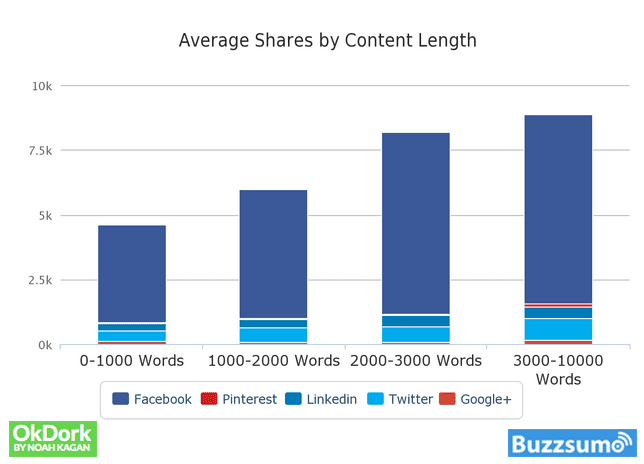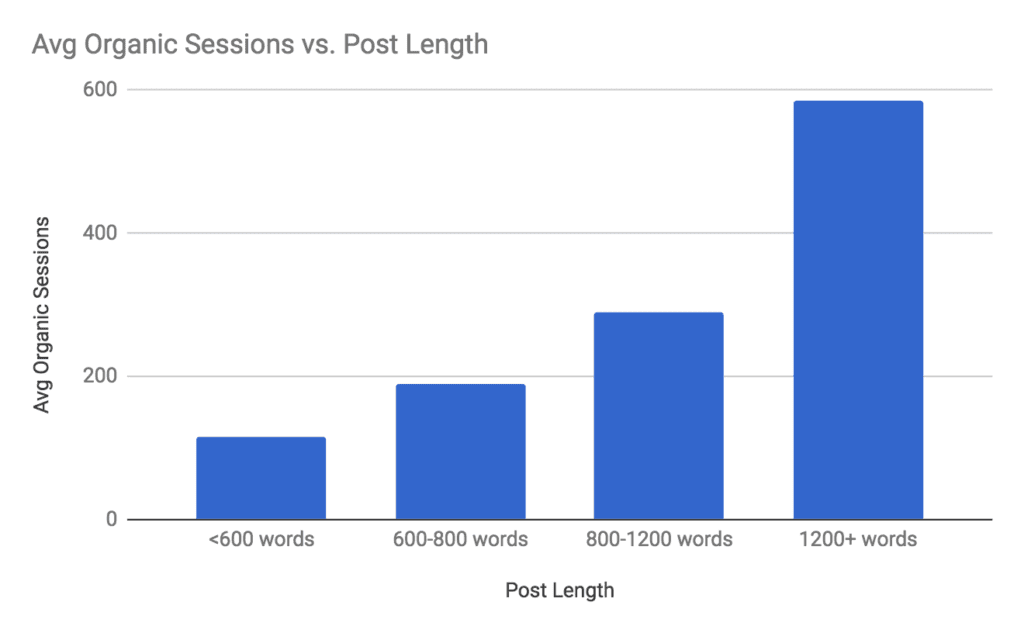SEO Guides, Tips & More!
Learn from Our Experience
Ideal Blog Length for SEO
Is there a magical word count that will boost the SEO potential for a blog?
Running a quality and consistent blog is a must for any company, brand, or individual looking to raise their profile and SEO rankings on major search engines like Google. But there are still many questions about how to write blogs that actually boost SEO.
One of the most common questions: How long should a blog post be to rank effectively?
While there are some general best practices for writing blog posts that provide real value, understanding exactly how to use blog post length effectively is a bit more complicated. Fortunately, we’ve created this thorough guide to explore ideal blog post length and how it can change based on the audience, keyword set, market, and other factors.
But first, it’s important to understand exactly how blog post length impacts SEO.
The Relationship Between Blog Length and Search Engine Optimization
In order for content to rank effectively, there are some parameters to follow. At an absolute minimum, content should be no less than 300 words. Why? Because search engines generally will be less kind when ranking articles shorter than 300 words. (Check out this Forbes article which tackles the minimum question pretty well) Many studies show that search engines implement a minimum word count to help them determine which articles are likely to contain worthwhile information for their audiences. Articles under that minimum word count will often be largely ignored by search engine rankings, leaving them undiscovered and unable to help boost a site’s visibility.
So does that mean that a blog post of 301 words will climb up the search engine rankings? Not exactly. Research has shown that generally, posts that reach the top of the rankings are at least 1,000 words in length, if not longer. In fact, posts that are 1,500 words are 70% more likely to be shared on Twitter and nearly 25% more likely to be shared on Facebook. That means that longer posts cannot only boost SEO rankings but lead to higher engagement in other areas as well. (source – Forbes)
Additional studies on length indicate the longer the blog, the greater the amount of engagement. In the graphs below, it’s clear to see the relationship between blog length and overall engagement. According to BuzzSumo, there is a positive relationship between the number of words in a post and the number of times it’s shared on social media.


But how did longer posts come to represent increased effectiveness when looking to top search engine rankings?
The History of Blog Length and SEO Ranking
The search engine ranking system of Google and other search engines has not always been what it is today. When these search engines first arrived on the scene, their algorithms were simple, and it didn’t take long for smart marketers, content writers, and brands to realize that they could take certain actions that would increase their chances of rising up the Search Engine Results Page (SERP).
Unfortunately, these actions usually didn’t line up with creating valuable content for readers. They were centered largely around stuffing keywords into content, obtaining as many backlinks as possible, and getting clicks—even if the content at the destination wasn’t particularly useful.
But this wasn’t the case for long. Soon, Google realized that their algorithms were leading to a lot of content being created—however, it wasn’t particularly helpful or informative content.
Over time, articles began to be rewarded more by the quality and value they provided, and longer articles provided more opportunities for pages to provide that quality and value. As a result, the optimal blog length rose from around 500 words to the 1,500 or so words that we see today.
But does that mean every single post should be more than 1,500 words? What exactly is the relationship between blog post length and SEO ranking?
When it comes to determining the right length for your blogs, it’s just as important to look at the specific circumstances as it is to understand the general rules that apply to everyone. While longer blog posts tend to do well, the metrics alone should not determine the length of a post.
Questions to Consider About Length
When writing blog posts, make sure to spend time developing an understanding of the company’s unique position and that of the audience. Aside from general SEO and keyword guidelines, there are a few key questions to ask in order to determine the right blog post word length. It’s also important to note that one of the most effective ways to master SEO strategy generally, including blog post word count, is to do research and diligently track the metrics. Over time, it will become clear what works best for each unique situation.
But with that in mind, here are some key questions to ask as it pertains to word length.
Who are you writing for, and why?
Let’s not forget what the content creation should be focused on—delivering real value to the audience. And who exactly that audience is will influence the type and length of content created.
For example, if writing for the average layperson, someone who may not have in-depth industry knowledge in a market but who exists mainly on the customer side, they may not be best served by a blog post that’s thousands of words long and goes into all of the details, esoteric information, and technical expertise. They might be better off with a simple, straightforward blog post of less than 1,000 words that serve them the info they need so they can move forward.
According to Moz,

If a blog post deals with a very specific, in-depth task that requires a great deal of guidance and extrapolation, then writing a longer post with more details will provide the audience with more value.
How long does a post need to be to cover the topic effectively?
This leads to the next conversation—how long does a post need to be to convey the necessary information? It’s a simple question, but it’s one that many content writers and brand marketers forget.
If a blog is a response to a question that could effectively be answered in 500 words, but that answer is spread across 3,000 words, then the post is not providing efficient value for the readers. It’s better to write to the length necessary to say what needs to be said, rather than stretching the content out over a longer period.
Is shorter better?
Some content writers and marketers wonder whether shorter is actually better. After all, short blurbs can help land that coveted spot as the featured answer at the very top of the Google search page.
That doesn’t mean that shorter is always the best choice. It’s really about identifying the best way to deliver the message in a way that’s clear, complete, and concise.
So, what are the pros and cons of short content versus long content when it comes to providing value, ranking well in SEO, and climbing the SERPs? Let’s start with short content.
The Pros and Cons of Short Content
Short blogs get a bad rap these days, and it’s true that longer-form content has the opportunity to get more attention from search engine algorithms. That said, shorter content also has some distinct advantages of its own.
For one, short blog posts are easier to write regularly. Without having to worry about writing long pieces, it is easier to be consistent about a blog schedule. This is nothing to sniff at, as regularity in posting is a major booster for SEO.
The ability to pump out more blog posts (without sacrificing quality!) also means the ability to cover a wider spectrum of topics, which could potentially expose the blog to a wider audience.
Finally, short content is often more readable for the average user. This could increase the chances of creating posts with a high engagement level, though it’s no guarantee.
Also, if the goal is to inspire action then a short blog post might be more effective. Some studies have shown that short content does a better job of converting readers to take action, whether it’s clicking on a button, a call to action, or signing up for services or contact list.
All that said, there are some disadvantages to shorter content. For one, there are fewer opportunities to include ranking keywords naturally in the text. Search engines have less of an opportunity to figure out where the blog fits in the hierarchy of content on the internet. Finally, all of the information readers are looking for may not be communicated within the content.
With that in mind, maybe it’s time to go long.
The Pros and Cons of Long Content
Longer blog posts, as we’ve discussed above, tend to do better in search engine ranking as they give Google and other search providers a better opportunity for their algorithms to understand the blog’s value, context, and category. This is partly why the ideal blog post length in 2019 is considered around 1,500-1,600 words.
To understand why it’s important to remember that one of the top ways Google determines the value of your content is how engaged readers are with it. How long do they dwell on the page, how much of the content are they actually reading? Past about seven minutes of reading time, which translates roughly to 1,500 words or so, they tend to lose interest and step away. (Note: This is a general trend, not a consistent fact. Many posts longer than 1,500 words do extremely well.)
Context is also vitally important for a blog post. The longer the post, the more information is given search engine algorithms to understand where it belongs in the search results. And the better Google understands the content, the more comfortable they are placing it higher in search rankings.
However, writing longer content comes at a price—literally. Keeping readers engaged through longer content pieces means paying a higher premium for quality writing. If a business chooses to handle the content itself, it means spending more time writing and less time managing other aspects of the business. Remember—writing long, useless blog posts are not an effective way to boost SEO. Length matters, but content quality should still be the #1 priority.
Embracing Quantity and Quality
We no longer live in the days where climbing search rankings was a matter of ‘gaming the system.’ While this might seem frustrating, it’s actually good news for companies and marketers who are dedicated to providing genuinely valuable content to their audiences, as this dedication will help them rise up the ranks.
That said, it doesn’t mean SEO considerations should be abandoned when it comes to the length of blog posts. It simply means that both quantity and quality should be taken into consideration. Be aware of the rules that dictate which blog posts tend to rank more effectively on Google, and then keep them in mind and focus on writing the best, most effective, and most valuable content possible for the intended audience.
Accomplishing this, the reward will be not only traffic, but quality traffic that results in leads, conversions, and sales—not to mention increased visibility for the brand as a whole.
The Ideal Content-Length
If looking for a hard and fast guide for how long blog posts should be, anywhere within the 1,500-1,600 word range is generally safe. But always remember that length is just one factor that contributes to the success of an SEO strategy. Quality content, a consistent posting schedule, genuinely useful blog topics, and a holistic SEO strategy that applies to the entire site and online presence are all necessary. Once these things are in place, added elements such as selecting the perfect blog post length will provide that extra boost to land business on the front page of search results for its keyword sets.
And isn’t that where we all want to be?
Bonus Resource – Check out our content on how to optimize a blog post.

